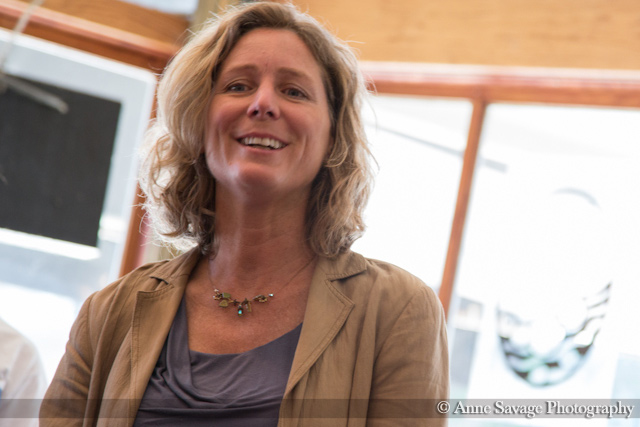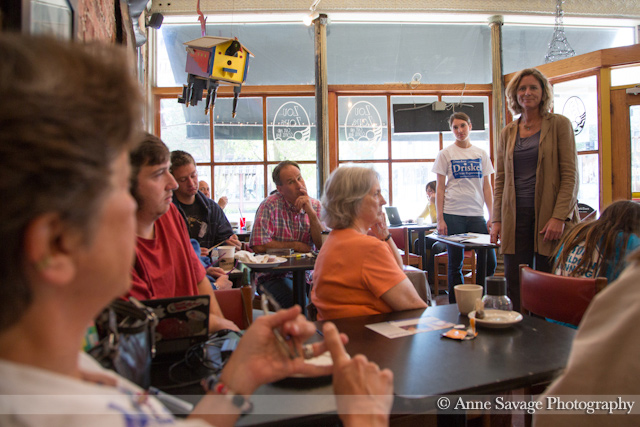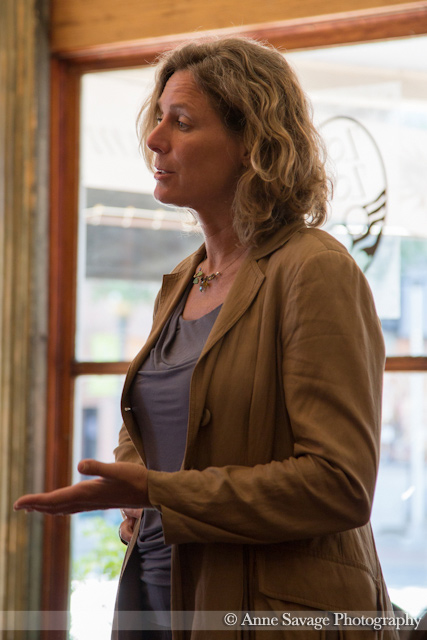Gretchen Driskell embodies what Mark Ouimet pretends to be
As Democrats in Michigan attempt to retake control over the House of Representatives, one of the most closely-watched races is in the 52nd District, the area west of Ann Arbor. Long a Democratic stronghold, it went to Republican Mark Ouimet in the 2010 Republican wave. The 2010 race was pure gutter politics on the part of the Republicans who ran no fewer than five increasingly offensive and nearly slanderous robocalls against Democrat Christine Green.
This year, another Democratic woman will face the Republican smear effort in the 52nd — Saline Mayor Gretchen Driskell. Driskell is less a politician than she is a true public servant. As Saline’s first woman mayor and longest-serving mayor, she’s been on the front lines of making her community the kind of place where people want to be to raise kids, start a business and enjoy the city’s charm. She’s served the community for over 20 years spending six years on the city council and another 14 as mayor.

When you first meet Gretchen Driskell, you’d never know that, in addition to being a real estate agent, she is the mayor of a Washtenaw County city. Behind her easy going, down-to-earth personality is a woman with wide ranging experiences serving on boards and working for groups involved in transportation as well as revitalizing cities and municipalities:
- Washtenaw Area Transportation Study
- Member of the Ann Arbor SPARK Executive Committee
- Vice Chairperson and Chair of the Southeast Michigan Council of Governments (SEMCOG)
- Former Chair of the SEMCOG Transportation Advisory Council
- Board member and former Vice President of the Michigan Municipal League (MML)
- MML Elected Officials Academy
- Chairperson of the MML Workers Compensation Fund
- Board Member of the National League of Cities
Clearly her work for these groups has paid off for Saline: the city has been named one of the Top 100 Small Cities in the Nation by CNN-Money three times under her leadership. The city has a bustling and successful farmers market, an arts & culture commission and has become a destination for people traveling in southeastern Michigan.
I sat down with Gretchen Driskell to discuss her candidacy and why she’s running against Mark Ouimet. I asked her if she was aware of the vicious attacks that Republicans ran against Christine Green in 2010 in an attempt to tarnish the reputation of another fine female public servant.
 “I’m sure they’ll come after me about something,” Driskell said, acknowledging the GOP’s desperation to keep this seat.
“I’m sure they’ll come after me about something,” Driskell said, acknowledging the GOP’s desperation to keep this seat.
“Probably that I raised taxes in Saline or raised my own salary 25%. A few years ago I made $3,000 a year. Now I make a whopping $4,000!” she joked. “But, I just got fed up with what’s happening in Lansing so I can’t let that stop me from running.”
Indeed, Ouimet, who has already been found using his legislative email account to attack Driskell in violation of state law, has already threatened Driskell, according to a source who asked to remain anonymous, warning her to get out of the race — typical scare tactics of a bully campaigner.
Driskell has a degree in Accounting and spent time working for a Washington, D.C. firm, KPMG, moving to Saline 24 years ago. I asked her how she came to end up Michigan.
“I was working for KPMG as the Assistant Controller. It was a really cool job. I did the budgets and financial statements for accountants in their national tax office, the third largest office for KPMG. But, it was tough. It was a lot of hours and I had my first kid and I was working so many hours that I never saw him. Then my husband got a job offer in Michigan. He took the job, we moved to Saline and I started working part time doing books and other things . I didn’t want to work full-time; I wanted to be with my kids.
“This gave me some free time, so I got involved with the community. There was article in the newspaper in Saline about their Rec Center which hadn’t been built yet. A local business, R & B Tools Foundation, had put out a million dollar challenge grant to the City of Saline if they could raise a million dollars in six months.
“A couple of weeks later, a guy came to my house, a member of the City Council, to talk about the grant. I told him, “I think that’s a really good project and, if there’s anything I can do to help, let me know. And then they made me fundraising chair and that’s how I got started being involved in the community.
“After that there would be another something that would come up. I did the Environmental Commission for a while and then there was an opening on the City Council. The mayor came to me and asked me to run. So I did and I ran on a platform of downtown revitalization. I ran unopposed but, ever since then, I’ve had opponents.
“Later, I was asked by a lot of folks in the community to run for mayor and so I did and I won.
“I really like it. It’s been a great privilege, I’ve learned a lot and I’ve had an opportunity to give back to the community and to contribute.”

Driskell has three college-aged students, one of whom is soon to enter the Naval Academy. A divorced, single mom, she has coped with managing both a family and a city on very tight budgets. She has clearly been successful at both. I asked her what her priority would be as a legislator.
“Education,” she said immediately.
“I think that education is probably the number one tool for recruiting businesses to the state. I think — no, I KNOW — that people aren’t going to come to the state if we don’t have a strong education system. Not only K-12 but higher ed, too. I think there are some really cool things we could do in this state to make Michigan a leader in the country instead of disinvesting in it. We have the capacity for it — we have the public institutions that are leading institutions in the country — we just need to have the mindset that makes that a priority.
“I think there are a lot of people in this district that get that. For so many of the communities here — Dexter, Chelsea, Saline — that’s why people move there, that’s why businesses come.
“I think education is an economic development issue and I think the state has made a really bad decision on the direction we’re going in. I don’t think we want to aspire to be a Mississippi or Alabama. What does that get us?
“Higher education is very important, too. The fact is, we need to get more kids through college and I don’t think that’s been a priority in Lansing. Also, retraining of adults is vital. Not just universities, but community colleges and technical schools can play a role in terms of investing in educating our workers .
“Finally, early education is critically important. It’s an investment in our future. Really, it’s just not that complicated.”
Driskell’s approach is in sharp contrast to that of her opponent who has voted to shift $1 billion in funding for schools into massive tax breaks for businesses and boasts about the passage of Public Act 4 — Michigan’s anti-democratic Emergency Manager Law — as one of his achievements. However, the Emergency Manager Law has yet to show success and will appear on the November ballot for repeal.
In addition, Ouimet has voted consistently with Republicans as they have sought to crush public employee unions, directing their most aggressive moves towards teachers. With her focus on education, I asked Driskell about this and she said it’s one of the things that got her into the race.
“The ‘good part’ is that I think they’ve gone too far,” she said, “And I think that people are really starting to catch on to that. When I talk to people door-to-door, there are so many of them that either have a family member that’s a teacher or they’re a retired teacher. There are all these different layers about why education is important, whether it’s a family member or it’s an important value to you because you have kids or as a grandparent. In communities in this district, people move here because of the schools.”
The Republican philosophy for stimulating job growth in Michigan is to lower taxes on businesses, taking that money from municipalities, schools and even the pensions of senior citizens to pay for it. This, they believe, will create an economic boom in our state. I asked Driskell about this.
“There are times when tax abatements are appropriate. For example, Saline does use abatements successfully. But we also have a very clear expectation of what you need to do. Do we go back after two years and say, ‘Did you create those jobs?’ No. But we do have a claw back. What happens most times is, if the business is growing, they are creating those jobs and more and they end up investing more and coming back.”
What’s more important tax relief, she said, is making cities attractive to businesses because they are good places to live and raise kids. This is a concept promoted by one of Driskell’s former colleagues at the Michigan Municipal League, Executive Director & CEO Dan Gilmartin, in his book The Economics of Place: The Value of Building Communities Around People.
“You need to have a reasonable tax environment, of course,” said Driskell. “But, at the end of the day, they want a place where they can raise a family, they want employees that are educated and a place where employees will move there because there’s a good school system.”
“Why are you a better candidate for the 52nd District than Mark Ouimet?” I asked Driskell.
 “I think I’m more in touch with what’s really going on on the ground,” she responded.” His background more recently was as a county commissioner. I don’t think that they are really in touch with what happens on a day-to-day basis in our local communities. I think there are a lot of people that don’t even know what county commissioners do, where that money goes, how it’s spent. You don’t have the kind of accountability that I have as mayor. When I go to the grocery store every day, people see me, they talk to me, they know who I am.
“I think I’m more in touch with what’s really going on on the ground,” she responded.” His background more recently was as a county commissioner. I don’t think that they are really in touch with what happens on a day-to-day basis in our local communities. I think there are a lot of people that don’t even know what county commissioners do, where that money goes, how it’s spent. You don’t have the kind of accountability that I have as mayor. When I go to the grocery store every day, people see me, they talk to me, they know who I am.
“I’ve worked with Mark on a lot of boards and he’s on a lot of nonprofits, but I’ve actually stopped doing a lot of that. I used to be a charter member of the Optimists and was in the Rotary but my passion is to learn how to be better. How can our community be better? How can our region be better? How can our state be better?
“That’s why I got on boards like the Southeast Michigan Council of Governments. How can our transportation system be better? That’s why I got on involved with the Citizens Advisory Committee to the state Transportation Funding Task Force. I was appointed by the governor to represent all the cities and villages around the state to help figure out a plan for fixing our transportation system and transportation funding.
“I also have the personal experience, frankly, of scraping by. Commercial real estate has not been booming. It’s picked up but it’s been really tight. I’ve got two kids in college and one in the Naval Academy now. So, I think I’m more in touch with people on a day-to-day basis, people that are working for a living and that are struggling.”
She also cited her experience with the Michigan Municipal League and her experience in building better communities.
“I’m very involved with issues around building strong communities and what I’m calling now ‘quality of place’ as opposed to ‘quality of life’. Quality of life is created by quality of place. That way of thinking comes out of my time as vice president of the Michigan Municipal League and working with people like Dan Gilmartin.”
“So what happens if you get to Lansing and Democrats are still in the minority?” I asked her. “How do you handle that?”
Laughing, she responded, “I was on the National League of Cities board and all my friends were asking me, ‘What are you doing? You’re going to get into that cesspool?! It’s all politics and you can’t really get anything done up there…’ Here’s the thing: I am not a protector, but I do think that, as a bare minimum, I would want to protect what we already have as individuals and workers and communities and education.”
“But I would also like to have aspirational goals in Lansing. I’d like to change the conversation. I think the morale in our country is horrible because all we do is bash each other and point fingers and blame each other instead of aspiring to being something better.
“As an example, President Obama had the high-speed rail initiative and the renewable energy initiative; I mean he’s had some really great programs and they just end up going nowhere! And then I go door-to-door and people say, ‘Oh, he hasn’t done anything.’ And I tell them, ‘You can’t do it without the legislature!’
“It’s really frustrating. I think [Barack Obama and I] are similar actually, because we both believe that we can work with people and get them to see a better future.
“I talked to [former state House Representative] Kathy Angerer about this because she was in the minority her first term, too. She said her first term she spent a lot of time back in the district, helping people solve their problems. I think if I’m in the minority, my biggest task right now would be educating people. Dan Gilmartin has heard this from me a million times. He’d say, ‘We can do this thing’ and I would tell him, ‘We need to educate the citizens, first. We need to figure out ways to educate people because, if they’re not educated, they don’t understand what’s happening and it’s not going to change.’
“It’s really that piece I think that’s a huge crisis in our country: the lack of media informing people and the inability to have civil discourse. I’d like to be part of changing that.”
Mark Ouimet is well-known as “a really nice guy”. He spent enormous amounts of time as a county commissioner pressing the flesh and making the connections that he needed to get elected. Like Governor Rick Snyder, he portrayed himself as a moderate who would work across the aisle when he got to Lansing.
As it has turned out, the opposite has been true. Mark Ouimet is not representing this Democratic-leaning district as a moderate. He has, in fact, voted almost 100% in lock-step with the far-right conservatives that now run the show in the House and Senate.
In contrast to Ouimet’s memberships on nonprofit boards to pad his resume and make connections, Gretchen Driskell has been on the front lines, confronting the issues that our cities face every single day. She has worked diligently to educate herself on the best practices for stimulating economic growth at the local level and has worked equally hard to implement those practices.
The result: a city that is flourishing compared with many of its neighbors. Despite the loss of a nearby Ford plant, Saline is doing comparatively well.
Gretchen Driskell recognizes that slashing budgets for schools and cities is counterproductive to creating economic vitality in Michigan. She knows that there needs to be a balance between a race-to-the-bottom approach that pits one city or state against another in terms of taxes and the need to invest in schools and cities as a way to stimulate growth. Nor is benefiting businesses at the expense of our cities and schools the correct path.
While Mark Ouimet professes to be working for the people of Michigan, Gretchen Driskell is actually doing it every single day.
“Education is an economic development issue,” Driskell says. She couldn’t possibly be more correct.
Please join me in supporting Gretchen Driskell for the 52nd District House seat. You can visit her website HERE and like her on Facebook HERE. Her campaign office is in downtown Dexter on the corner of Baker Road and Dexter-Ann Arbor Road.



